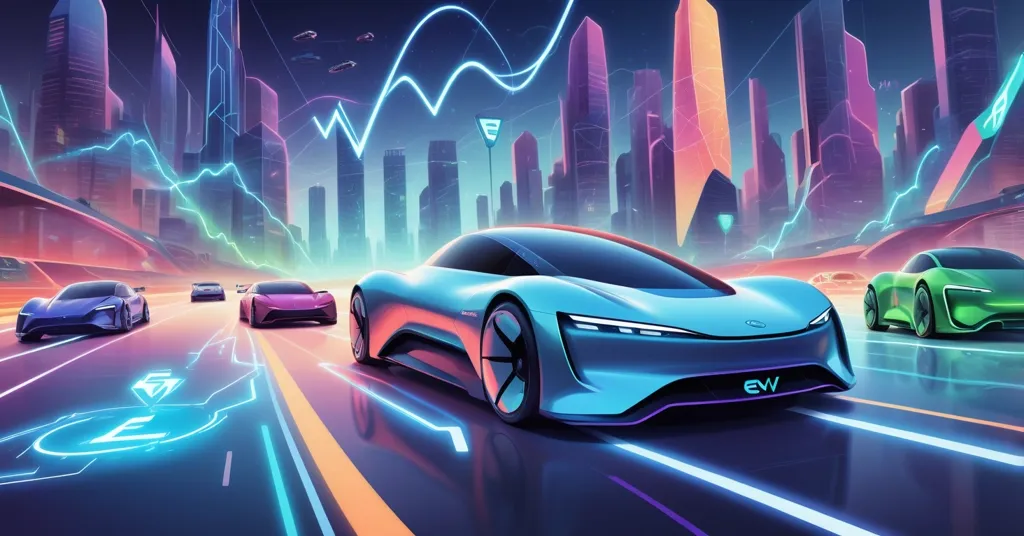Tesla’s EV Sales Drop as BYD Surges: Hype Warning for Crypto and Tech Investors

Tesla’s EV Sales Slide as BYD and Waymo Charge Ahead: A Speculative Hype Warning for Crypto and Tech Alike
Tesla, long hailed as the electric vehicle (EV) kingpin, is stumbling with declining sales and fierce competition, while its valuation skyrockets on futuristic promises of robotaxis and humanoid robots. Much like the wildest altcoin pumps in the crypto world, the question looms large: is Tesla’s hype grounded in reality, or are investors just buying into another visionary mirage?
- Sales Decline: Tesla’s EV deliveries are expected to drop from 1.8 million in 2023 to 1.7 million in 2024.
- Competitor Gains: BYD overtakes Tesla in Europe, while Waymo leads in autonomous ride-hailing.
- Speculative Valuation: 95% of Tesla’s stock price banks on unproven projects, not current earnings.
- Regulatory Risks: Full Self-Driving (FSD) tech faces serious safety probes and legal scrutiny.
- Crypto Parallel: Elon Musk’s Bitcoin history hints at decentralized finance possibilities—or more hype.
Tesla’s EV Struggles: Losing the Lead to BYD
Tesla’s core business—electric vehicles—still drives 80% of its revenue in 2024, with the remainder from energy storage, solar panels, and charging stations. Yet, the numbers tell a grim story. After selling 1.8 million vehicles in 2023, Tesla is projected to slip to 1.7 million this year, a far cry from traditional giants like General Motors (over 5.4 million units) and Ford (over 3.6 million). This isn’t just a minor hiccup; it’s a signal of eroding dominance as highlighted in recent reports on Tesla’s falling EV sales. Tesla’s auto division profit margins are also tightening to around 17%, creeping closer to Ford and GM’s slimmer cuts, even with the cushion of zero-emission credits. For those new to the term, zero-emission credits are financial incentives Tesla earns for producing low-emission vehicles, which it can sell to other automakers failing to meet regulatory quotas—a neat bonus, but not enough to hide the cracks. Reports suggest these credits have historically contributed hundreds of millions annually to Tesla’s bottom line, yet sales declines are outpacing such perks.
Why the downturn? Market saturation in key regions, aggressive price wars, and shifting consumer tastes toward hybrids are hitting Tesla hard. Unlike its pure EV focus, competitors are adapting. BYD, the Chinese EV powerhouse, is steamrolling Tesla in Europe, posting a jaw-dropping 359% year-on-year registration surge in April 2024 while Tesla’s plummeted by 49%, per JATO Dynamics. BYD’s dual strategy—offering both Battery Electric Vehicles (BEVs, fully electric) and Plug-in Hybrid Electric Vehicles (PHEVs, combining electric and gas power)—gives it flexibility, especially as it pivots to PHEVs to sidestep EU tariffs on Chinese-made EVs, as detailed in this BYD market surge analysis. Some analysts predict BYD could eclipse Tesla globally by year-end, a gut punch to a company once seen as untouchable. Felipe Munoz of JATO Dynamics nails the shift:
“This is a watershed moment for Europe’s car market… Tesla has led the European BEV market for years, while BYD only began operations beyond Norway and the Netherlands in late 2022.”
Beyond Europe, Tesla faces pressure in China, where BYD dominates with local market savvy and government backing, and in the US, where softening EV demand and production bottlenecks—think delayed Model Y updates—add to the woes. Discussions on platforms like Reddit further explore this intense Tesla vs BYD competition. It’s a stark reminder that even pioneers can falter when competition accelerates, much like Bitcoin faces challenges from altcoins filling niche gaps in decentralized finance.
Autonomous Ambitions: Waymo Outruns Tesla’s FSD Mirage
While BYD chips away at Tesla’s EV crown, Waymo—Alphabet’s autonomous vehicle arm—is schooling it in the driverless future Tesla keeps promising. Waymo operates 1,500 robotaxis, clocking over 250,000 paid rides weekly across four US cities, with partnerships like Uber boosting its reach. Its safety record isn’t flawless, but it’s leagues ahead of Tesla, with real-world execution over speculative demos. Valued at around $45 billion (though some estimates peg it lower with massive upside), as discussed in Waymo’s valuation insights, Waymo’s progress is tangible—something Tesla can’t claim. Tesla’s robotaxi rollout, teased for June 22 in Austin with a small fleet of Model Y vehicles, feels like another delayed blockchain upgrade: always “two weeks away.” If Elon Musk’s track record on timelines is any indicator, don’t hold your breath.
Tesla’s Full Self-Driving (FSD) tech, central to its autonomous dreams, is a regulatory and safety minefield. Unlike Waymo and others who blend cameras, lidar (laser-based mapping for precision in fog or dark), and radar (radio waves for distance sensing), Tesla stubbornly relies on cameras alone. Critics argue this approach falters in poor visibility, and the data backs them up with comparisons like those found on Waymo vs Tesla FSD debates. The US National Highway Traffic Safety Administration (NHTSA) is investigating 2.4 million Tesla vehicles (2016-2024 models) after crashes in low-visibility conditions, including a pedestrian fatality in Arizona in November 2023, with further details in this NHTSA investigation update. Past recalls—over 2 million vehicles in December 2022 and 363,000 in February 2023 for issues like ignoring speed limits or rolling through stop signs—highlight systemic flaws. Worse, the US Justice Department is probing potential criminal liability over FSD marketing claims. For the uninitiated, FSD is Tesla’s advanced driver-assistance software, pitched as a stepping stone to full autonomy, but it still demands human oversight and isn’t truly self-driving, despite Musk’s chest-thumping:
“If somebody doesn’t believe Tesla is going to solve autonomy, I think they should not be an investor in the company.”
That’s a bold bet when your tech is linked to fatalities and federal probes. Consumer trust is fraying too, with lawsuits and public backlash piling up, much like crypto projects bleed community faith after hacks or broken promises. Waymo’s operational grind mirrors Ethereum’s usable decentralized apps, while Tesla’s FSD feels like a speculative layer-1 chain—shiny on whitepapers, risky in practice.
Speculative Bubble: Valuation Detached from Reality
Tesla’s market cap swings between $370 billion and a staggering $1.6 trillion, with stock price targets ranging from $115 to $500—a wild disparity rare even in the volatile S&P 500. Nicholas Colas of DataTrek Research cuts through the fog:
“Most of the stock price is tied to Tesla’s unproven ambitions. The present-day business isn’t enough to justify the price.”
Colas estimates only $20 of Tesla’s $322 share price reflects current earnings; a whopping 95% is speculative, hinging on moonshots like robotaxis, FSD, and Optimus, Musk’s humanoid robot. Musk claims Optimus could one day rake in $10 trillion in revenue—100 times Tesla’s current annual sales. That’s a fantasy worth a Dogecoin-powered carnival barker’s pitch. Right now, Optimus is a remote-controlled demo, not a cash cow. Tesla-focused YouTuber Herbert Ong, with over 100,000 followers, dismisses the core business:
“The car business is really a sideshow.”
Hard to swallow when 80% of revenue still comes from that “sideshow.” This speculative fever isn’t unlike crypto bubbles—think meme coins soaring on Reddit hype with no utility. Tesla’s valuation mirrors the dot-com era’s worst excesses, where retail investors pile in on charisma over fundamentals, a trend explored in discussions about Tesla’s valuation and Bitcoin ties. For our crypto crowd, it’s a familiar trap: are we backing Musk’s vision or just his Twitter clout?
Political and Brand Risks: Musk’s Polarizing Shadow
Musk’s larger-than-life persona is a double-edged sword. His recent political spats, including a public fallout with Donald Trump over MAGA-related comments, have dented Tesla’s brand among certain demographics. More critically, a potential Trump administration could relax emissions standards, slashing the value of Tesla’s zero-emission credits—possibly costing hundreds of millions in revenue, per some analyst estimates. It’s a regulatory wildcard not unlike the SEC’s erratic crackdowns on crypto tokens, keeping everyone on edge. Musk’s antics, while disruptive in the spirit of decentralization, risk alienating customers and policymakers alike, a cautionary tale for centralized figures wielding outsized influence in any space—be it tech or blockchain. Background on Tesla’s broader challenges can be found in this Tesla overview.
Crypto Parallels: Musk’s Bitcoin Play and Decentralized Lessons
For us in the Bitcoin and blockchain sphere, Tesla’s saga hits close to home. Musk isn’t a stranger to decentralized finance—he drove Tesla to buy $1.5 billion in Bitcoin in 2021, only to offload 75% at a loss in 2022 amid market downturns. His tweets have pumped Dogecoin to absurd highs, sparking accusations of market manipulation akin to crypto whale tactics. Tesla even briefly accepted BTC payments before backtracking over environmental concerns (ironic for an EV maker). Could Tesla revisit crypto as a hedge against EV struggles? Perhaps tokenizing vehicle ownership on a blockchain or building a decentralized charging network—ideas floating in tech circles. But Musk’s whims also mirror the risks of centralized influence in crypto; one tweet can tank or spike markets, much like his FSD claims sway Tesla’s stock.
This speculative dance is a lesson for Bitcoin maximalists and altcoin fans alike. Tesla’s story echoes countless crypto scams where hype outstrips substance—think ICOs promising the moon with no code to show. Yet, competition from BYD and Waymo reflects effective accelerationism at work: decentralized pressure forces innovation, just as altcoins challenge Bitcoin by filling niches it can’t or shouldn’t. Tesla’s early EV dominance, like Bitcoin’s first-mover edge, proves visionaries can reshape industries. But without delivery, it’s just noise. Let’s not forget Musk’s knack for defying odds—SpaceX and early Tesla wins show he can pull rabbits from hats, even if late. Still, are we betting on genius or gambling on charisma?
Key Takeaways and Burning Questions
- Why are Tesla’s EV sales dropping while BYD surges in 2024?
Tesla’s deliveries are slipping from 1.8 million to 1.7 million due to market saturation, price wars, and weaker demand, especially in Europe where BYD’s 359% registration jump—fueled by flexible BEV and PHEV offerings—has stolen the lead. - How does Waymo’s autonomous tech stack up against Tesla’s FSD?
Waymo’s 1,500 robotaxis deliver over 250,000 paid rides weekly in four US cities, proving real-world utility, while Tesla’s FSD, reliant on cameras alone, lags with unproven robotaxi plans and faces safety and regulatory hurdles. - What safety and legal risks threaten Tesla’s Full Self-Driving tech?
FSD’s camera-only system is tied to crashes, including a pedestrian fatality, prompting NHTSA probes into 2.4 million vehicles and a Justice Department criminal investigation, signaling major safety and legal roadblocks. - Is Tesla’s sky-high valuation justified, and what’s the crypto connection?
With 95% of its stock price tied to speculative bets on robotaxis and Optimus, Tesla mirrors crypto bubbles driven by hype over utility—a red flag for investors in tech and digital assets chasing unproven promises. - Could Musk’s crypto history shape Tesla’s future strategy?
Tesla’s $1.5 billion Bitcoin buy in 2021, later 75% sell-off, and Musk’s Dogecoin pumps suggest potential for crypto payments or blockchain use cases, though his centralized influence risks market volatility akin to whale manipulation. - What lessons does Tesla’s saga offer the crypto community?
Tesla’s speculative challenges warn against overpromising without delivery, a pitfall seen in crypto scams, while BYD and Waymo’s competition highlights how decentralized innovation drives progress—key for Bitcoin and altcoin ecosystems alike.
Tesla’s trajectory is a high-wire act between disruptive genius and overblown fantasy. For every $10 trillion robot dream, there’s a sobering 49% sales drop in Europe. Much like our fight for Bitcoin and blockchain to upend financial systems, Tesla’s push to reinvent transport is messy, cutthroat, and riddled with pitfalls. We champion decentralization and effective accelerationism—competition from BYD and Waymo is the pressure cooker that fuels progress. But let’s keep it real: hype without results is just hot air, whether it’s a sleek EV or a flashy new token. Tesla’s struggles remind us to back substance over sizzle, a mantra as vital for Musk’s empire as it is for the crypto revolution we’re all pushing forward.



